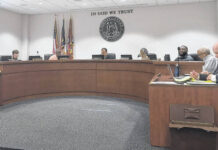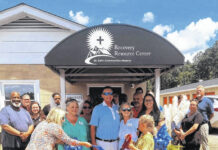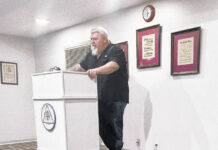
Kenya Myles prepares for her second American Idol Audition with the help of Leon Gatewood on Oct. 15 at the Holla Center.
Liz O’Connell | Anson Record
MORVEN — While loosening up her pipes with a gulp of Sprite, Kenya Myles looked for an instrumental version of a song to perform, wishing she had the familiar sting of a McDonald’s Sprite to wake her up even more.
The 16-year-old sophomore convinced Leon Gatewood, CEO of the Holla! Center, to let her sing an original cover of “32 Sessions” by Summer Walker, as he sets up the speakers. Gatewood gave her a phone holder so she can record herself for her American Idol audition, her second audition this year.
Myles first auditioned virtually in front of a live producer, who coincidentally is from Charlotte. He knew exactly where Myles was standing during her audition, the Holla! Center in Morven.
“He told me I had a great voice, a very powerful voice,” Myles said. “After that he told me he’d get back to me in an email, which was supposed to be a week later, but it didn’t come a week later and it started to scare me! Then it came and I was disappointed. But you fall, you get back up.”
The email explained she did not make it through to the next round. Hopes shattered for the young singer, but a surprising second shot came along a few days later.
American Idol reached out with a link to send an audition video to potentially be selected and continue on the journey towards Hollywood — or in this unconventional year, virtual Hollywood.
Myles and Gatewood laugh together while figuring out the technology for her second audition, as if they were brother and sister having played with each other hundreds of times before.
Gatewood moved a high-top table in front of her to place the recording stand on. Myles got her comfortable and preferred way of sitting to sing, instead of Gatewood’s suggestion of standing. She turns to Gatewood with her signature one blue eyebrow look, ready to do her thing, and he hits “play” on the music.
Instruments flowed through the room and Myles instantly connected to the camera and her audience, her full voice showing maturity beyond her years.
Singing is nothing new for Myles and her family. She recalls growing up in Saron Missionary Baptist Church where he grandmother sings in the choir and her mother sang too.
“When I first started singing, I think I was three,” Myles remembers. “I was in the living room and the movie ‘Cadillac Records’ came on and there’s a song called ‘I’d Rather Go Blind.’ I started singing it, just blowing it out. My momma started crying and said, ‘Oh my baby is blessed!’’’
Myles’s mother always told her that God took her own voice and gave it to her daughter, a memory Myles carries with her in her performances. Her mother tragically passed away when she was only 9-years-old.
“My mom passing had a big impact on me and really getting into the artistry of music and writing and poetry,” Myles said. “I wrote my first poem in third grade, which was the year she passed … I wrote a poem about my mom and then after that I started writing more poetry and I started listening to beats. I started writing raps and songs. That was my way of learning to cope.”
Her writing never stopped. She still expresses herself through words on her Notes app on her phone or in journals, drawing from personal experiences, constantly writing about whatever she is feeling.
“When I write my music, on every page I take a highlighter because it’s see-through and I put my signature over the page, ” Myles pauses. “No copyright!”
Her writing and poetry also draws from experiences Myles has encountered being a black female. She recalled a poem she wrote in seventh grade for a writing contest that reflected the racism she felt, even at 12-years-old. Those views have been updated in poems that reflect what she sees today, following protests and riots breaking out across the nation after the killing of George Floyd and Breonna Taylor at the hands of police officers.
“When I was speaking with the principal she was like, ‘You do realize that you targeted a certain group of people,’” Myles said. She replied, “I do understand that, but if they feel offense, then it applies to them. If they feel offense, then they should understand how we feel, like people my skin color. We are placed and pocketed and pushed into a certain group or a certain category every day of our lives.”
She recited a poem from her phone that describes her fear of wearing her jackets with hoods because of how Trayvon Martin died and asking how can white people chant “All Lives Matter” when their ancestors were the ones who enslaved her ancestors?
“For those words to come out of a child’s mouth, you know there really is a problem,” Myles said. “For a little kid to say anything like that, you have to know it’s the truth because little kids do not lie.”
She said she’s been followed in stores and received dirty looks because of her skin color. While sitting in her yard one day, she noticed a truck drive by with confederate and KKK flags flying in the back. The truck circles back around and chucks out the window a three-day old expired strawberry milk container, covering her from head to toe in the spoiled milk.
Her biggest fear as she starts driving is not of getting into an accident of having a flat tire, but rather getting pulled over by a police officer.
These experiences and feelings are woven into Myles’ music. She sees herself as a storyteller, not a rapper or an R&B artist.
“I’m not rapping about money and cars and all of that,” Myles said. “I’m rapping about stuff I’ve been through, stuff I know. It comes out naturally.”
Ever since she was little, Myles wanted to be heard. She laughed while remembering when she was in her first play, “The Wizard of Oz,” and how she was so mad not being cast as Dorothy. Instead, she shown bright as a flower.
“I was the loudest flower,” Myles said. “Y’all are going to hear me because this is what I came here for, for y’all to hear me!”
Recently the county heard her as she amazingly performed as Rafiki in the Holla! Center’s production of The Lion King.
Now with her second audition for American Idol done, she’s anxiously waiting to see what the future holds for her.
Gatewood originally urged her to audition — or, rather, told her she “must” audition. That same Tuesday night, Myles and her grandmother filled out the paperwork and signed. Despite the disappointing initial feedback, Myles remains hopeful.
“This has always been my dream,” Myles said. “To make music, to be able to provide for my family. I want to move my grandma out of Anson County. This is not where I want to spend the rest of my life. I’m going to do for my community, obviously come back and build, but this is not where I want to spend the rest of my life. I’d rather do a job that I love than do I job that I hate and have to and this is the job I love.”
The American Idol hopeful took another sip of her Sprite, waiting for feedback on her latest audition that could change her future forever.
Reach Liz O’Connell at 267-467-5613 or at eoconnell@ansonrecord.com. Follow on Twitter at @TheAnsonRecord.




